Try knitting for your mental health
Psychologist says hand crafts can put brain in ‘flow’ state, create sense of mastery to treat depression
OLIVIA WOLF | EVERGREEN PHOTO ILLUSTRATION
This columnist feels learning to knit improved her life. It helps her connect with people in more meaningful ways and get in the zone.
March 27, 2019
On March 3, I learned to knit. I bought some cheap knitting needles, a skein of blue yarn and spent an hour struggling with my first row.
I didn’t suddenly age 40 years nor decide I wanted to follow in my grandmother’s footsteps. I wanted to treat my depression.
I was inspired to pick up the handcraft from the wise words of Tumblr user Higgsboshark.
“The thing about knitting is it’s much harder to fear the existential futility of all your actions while you’re doing it,” Higgsboshark wrote on the blog, “Like ok, sure, sometimes it’s hard to believe you’ve made any positive impact on the world. But it’s pretty easy to believe you’ve made a sock.”
My struggle with depression and anxiety has spanned most of my young adult life. I didn’t realize it wasn’t normal for a 16-year-old to be so disinterested in her hobbies that she’d rather spend time hiding in bed for hours. It wasn’t until I made it to Pullman and no longer had a support system that I realized something had to change.
“College presents a lot of basic life demands,” said Walt Scott, director of the WSU Psychology Clinic. “It’s not surprising that college students have elevated rates of depressive and anxiety symptoms.”
I’ve been on antidepressants for two years, and sometimes I praise them because they help regulate the dopamine and serotonin levels in my brain. Other times I feel no different. After a particularly hard few weeks of feeling completely helpless, I needed a change.
I didn’t want to go through the hassle of adjusting my meds without insurance, a whole different can of worms in itself, so I decided on something new — knitting.
Scott said the WSU Psychology Clinic uses several psychological methods to treat depression that are just as effective as antidepressants at reducing depressive symptoms. One is behavioral activation which focuses on filling an individual’s schedule with activities that fit with their values and interests to give them a sense of engagement, he said.
“Your initial thought when you’re chronically depressed is the activity isn’t going to be much fun,” Scott said. “So you tend to see a reduction in engaging in activities that give you a sense of mastery and reward in depression.”
Handcrafts like knitting, crocheting and cross stitch, after the initial learning curve, are engaging and feel rewarding as you’re making something for yourself or someone else to enjoy.
Another psychological method is finding the optimal psychological state, called ‘flow,’ and staying in it as often as possible. The state of flow comes when people are engaged in moderately challenging activities that require some development of skill and are receiving second by second feedback on how they’re doing, like playing an instrument, rock climbing or knitting.
“In flow, you get lost in the activity and are not as mindful of time,” Scott said. “People describe that they lose the self but kind of paradoxically the self feels stronger after, even though during the activity they had no self-awareness and they weren’t reflecting on the self.”
Scott said losing the self can be a great treatment for depression because depressed people can get in rumination mindsets which can be detrimental.
Self-determination theory argues that humans have three fundamental psychological needs, Scott said.
The first is relatedness, a sense of connection to the people around you. The second is autonomy, control rather than coercion. The third is mastery, a sense of confidence and being effective.
“It’s really frustrating to us when we feel powerless and ineffective,” Scott said. “Any activity that gives you that sense of mastery or effectiveness is a very strong antidote to feeling depressed.”
My first scarf, I will admit, is quite horrible. I only knew the technical components to what I was doing and didn’t understand the theory behind scarf-making. I didn’t understand that splitting the yarn to create an extra stitch was a bad idea, which resulted in a vaguely phallic-shaped scarf.
Soon though, my knitting on airplanes, in between classes and in front of family friends taught me more. I knew more people who knitted, crocheted or cross-stitched than I could have imagined. I received countless tips and tricks and even some free yarn to add to my collection.
Knitting does wonders for the brain, but also automatically gave me something more in common with a near stranger from a few classes or from the flight attendant on the airplane. I’ve never felt closer to my best friend’s mom than when I planned the scarf I’ll be making for her. I get excited when I’m home from class every day because I get to work on my dad’s 2019 Christmas present.
I’ve never used my phone less than I have in the 24 days I’ve been knitting, yet I’m more connected to the people who matter most to me than ever. I feel less hopeless and like my existence is making the world better for the first time in my life.
Three weeks ago, I picked up a handcraft after reading a Tumblr post and it saved my life.

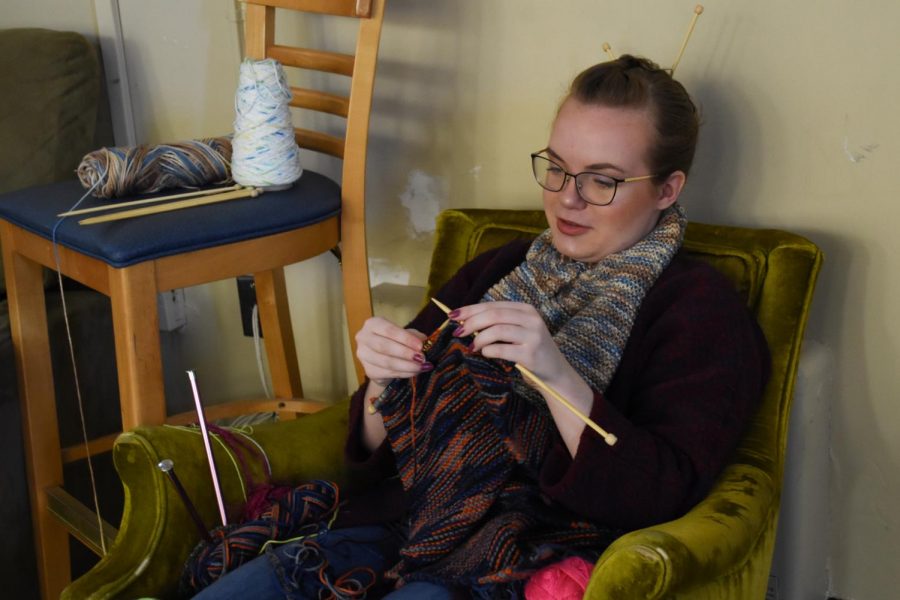





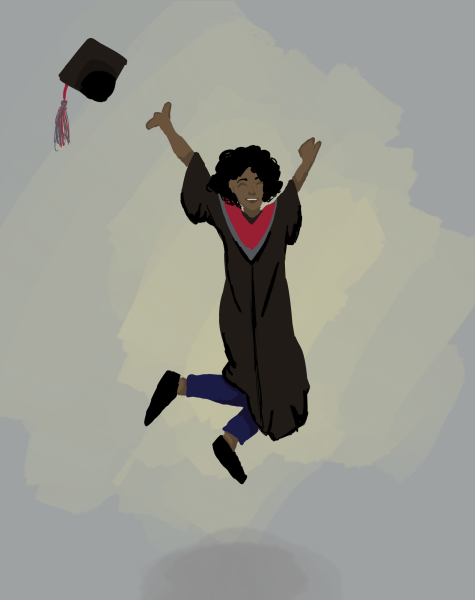
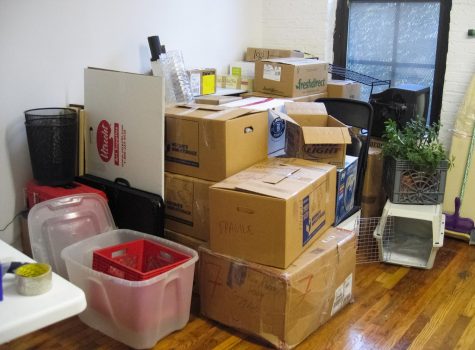
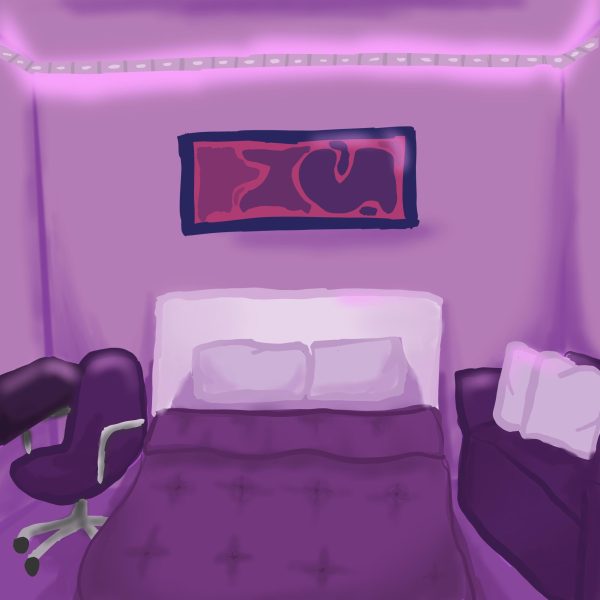



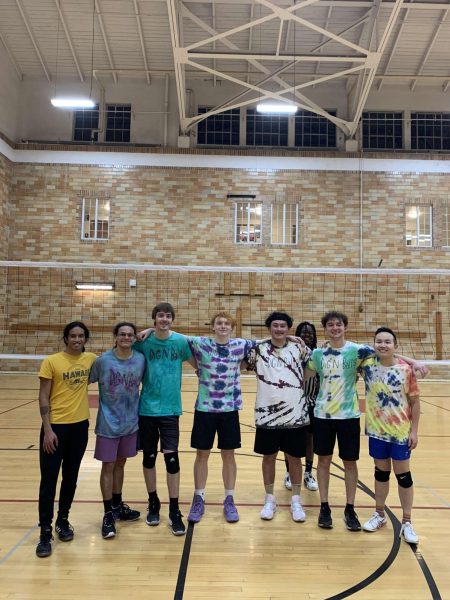

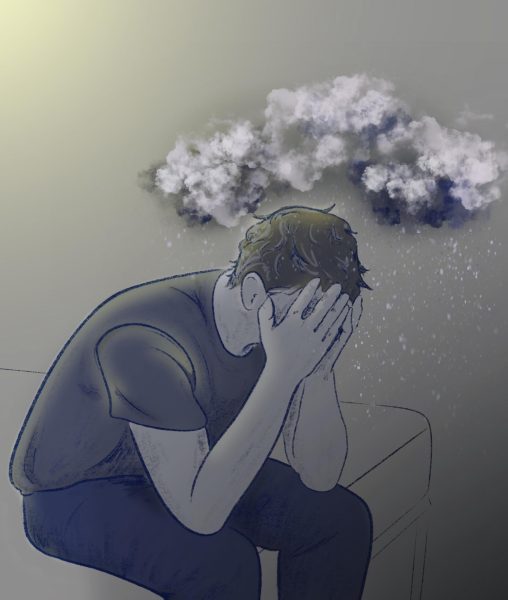


Isabel Jordan • Apr 4, 2019 at 1:19 pm
A beautifully expressed article, thank you. It’s especially heartening to read your comment about more time spent knitting and less on your phone… There’s an organisation called Stitchlinks in the UK which promotes the use of knitting and crochet for mental health. And a note about male knitters, especially Scandinavian ones: two of the quirkiest knitting designers I know of are Arne and Carlos: link to their blog here https://arnecarlos.com/
Happy knitting, welcome to a very supportive world.
Anne • Apr 4, 2019 at 3:00 am
I’m so glad to hear you have discovered that knitting helps — my husband suffers from depression and no matter how often I get articles to him he won’t learn and yet he’s seen how much my knitting is to me, I love when I have finished a pair of socks cos it means that I can start the next ones
Good luck with your knitting and you just might knit socks xxx
Lynn Riker • Apr 2, 2019 at 11:38 am
Welcome to the world of knitters. It’s a grand place full of friendly, helpful enablers (Hey isn’t this a great color – feel this it’s so soft). And by the way, knitting is also good for your body’s health.
Cherrie Mckinstry • Apr 2, 2019 at 9:22 am
I feel the same great affects of knitying or any fiber project.. Im working on a farm collective for food security and a place people can teach crafts, sell crafted items including fiber, and learn a skill or buy a kit.
We also are for food security for the road ahead..
I love the colors of your yarn.. so beautiful…
Susan Wright • Apr 2, 2019 at 9:20 am
Chloe, I’m so happy you have discovered knitting – a lifetime anti-depressant! I learned at the age of 8, but didn’t succumb to a passion (obsession?) for it until about 20 years ago. In this country we have a skewed impression that only old women knit (old women are wise as well…). When I went to Amsterdam last year, I made a point of attending an open Knit Night at the local shop. There were about 30 women present and at age 64, I was the second-oldest woman there. Nearly everyone else was in their 20s and 30s. Many different countries and languages were represented although English was used as the lingua franca. It was exhilarating to think that we all had this one thing in common. It was easily the unforgettable highlight of a very fun trip. I love knitting because it is at the same time challenging, calming, frustrating, soothing, and surprisingly social (I used to think of knitting as a solitary venture, but I know better now). Keep at it, Chloe! Hope to see you on Ravelry!
Sheri Martin • Apr 2, 2019 at 8:47 am
Great article. I wonder how many men knit. I know of only 3 and one of them was from Norway and passed away in the 90’s. The other two are about my age…seniors. One still knits and I haven’t asked the other one if he still knits. He learned that art in the Navy as a young man. I know a young man who struggles with depression and would love for him for find the flow as you mentioned in this fantastic article. I am going to print this out and let him read it and perhaps it will spark something that he will like doing. He is very artistic and creative and a wonderful human being.
Jane Wyatt • Apr 1, 2019 at 9:11 am
I knit nearly every day ( I’m retired) and feel lost if I don’t have yarn and needles with me. My mother taught me to knit many years ago and I’ve been knitting for nearly 50 years. When my husband was going through cancer treatment and I was his caregiver, I would always knit at least 1 or 2 rows of a simple scarf no matter how tired I was before going to bed. It lowered my stress and anxiety levels and had a calming effect on me which I badly needed. Us older knitters know how therapeutic knitting can be so why keep it a secret? Let’s get the word out!
Linda • Mar 30, 2019 at 9:56 am
My grandmother taught me to knit when I was three years old, and I almost haven’t missed a day knitting since then. I’m now nearing 70. I have never ever suffered with depression, although my husband has medication for it, and some of my siblings do too. I credit knitting with keeping me level, and grounded. It is my happy place!
Bea • Mar 30, 2019 at 1:25 am
So happy for you. Knitting maybe saved me from a dark dark dark hole I felt I was in. My mind restarted, because after knitting, I started wishing to learn new things. I learned how to crochet (no Bea, you CANNOT be unable to crochet, are you kidding??), and know it’s become kinda beautiful and relaxing addiction!!!
Laura • Mar 28, 2019 at 3:01 pm
I’m glad that knitting has helped you. I have also suffered from depression and find that knitting has helped me, too. I think that everybody who’s so inclined should give it a try. But, please, please, please stop with the “Knitters are old women” intro. (“I didn’t suddenly age 40 years nor decide I wanted to follow in my grandmother’s footsteps.”) You are not unique in writing this, as I read it in articles like this all. the. time, and you just happened to be the one who made me think “Damn it! Not again!” Many knitters are indeed older women. There’s nothing wrong with that, but starting your otherwise-good article with that is…um…not helpful? And ageist. A more interesting and important point is that knitters can be all ages and genders and often have little in common other than a love for making things with yarn. Check out the “people” section on Ravelry.
Laura Boyd • Mar 28, 2019 at 7:19 am
Great article and points well made. I’m an avid quilter which requires a sewing machine along with so many other tools, etc. In recent years, I discovered hand embroidery which can be toted with me at all times in a small pouch. I love my new “addiction” and the peace and contentment it brings me. Happy knitting yo you!!
Nik • Mar 27, 2019 at 1:55 pm
This made me remember how calm I feel when I pick up my knitting at the end of a stressful day. It brings me joy to see that you’ve discovered this.